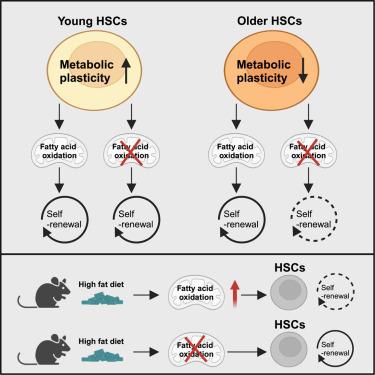当前位置:
X-MOL 学术
›
Cell Stem Cell
›
论文详情
Our official English website, www.x-mol.net, welcomes your
feedback! (Note: you will need to create a separate account there.)
Different effects of fatty acid oxidation on hematopoietic stem cells based on age and diet
Cell Stem Cell ( IF 19.8 ) Pub Date : 2024-12-20 , DOI: 10.1016/j.stem.2024.11.014 Salma Merchant, Animesh Paul, Amanda Reyes, Daniel Cassidy, Ashley Leach, Dohun Kim, Sarah Muh, Gerik Grabowski, Gerta Hoxhaj, Zhiyu Zhao, Sean J. Morrison
Cell Stem Cell ( IF 19.8 ) Pub Date : 2024-12-20 , DOI: 10.1016/j.stem.2024.11.014 Salma Merchant, Animesh Paul, Amanda Reyes, Daniel Cassidy, Ashley Leach, Dohun Kim, Sarah Muh, Gerik Grabowski, Gerta Hoxhaj, Zhiyu Zhao, Sean J. Morrison

|
Fatty acid oxidation is of uncertain importance in most stem cells. We show by 14C-palmitate tracing and metabolomic analysis that hematopoietic stem/progenitor cells (HSPCs) engage in long-chain fatty acid oxidation that depends upon carnitine palmitoyltransferase 1a (CPT1a) and hydroxyacyl-CoA dehydrogenase (HADHA) enzymes. CPT1a or HADHA deficiency had little or no effect on HSPCs or hematopoiesis in young adult mice. Young HSPCs had the plasticity to oxidize other substrates, including glutamine, and compensated for loss of fatty acid oxidation by decreasing pyruvate dehydrogenase phosphorylation, which should increase function. This metabolic plasticity declined as mice aged, when CPT1a or HADHA deficiency altered hematopoiesis and impaired hematopoietic stem cell (HSC) function upon serial transplantation. A high-fat diet increased fatty acid oxidation and reduced HSC function. This was rescued by CPT1a or HADHA deficiency, demonstrating that increased fatty acid oxidation can undermine HSC function. Long-chain fatty acid oxidation is thus dispensable in young HSCs but necessary during aging and deleterious with a high-fat diet.
更新日期:2024-12-20






























 京公网安备 11010802027423号
京公网安备 11010802027423号